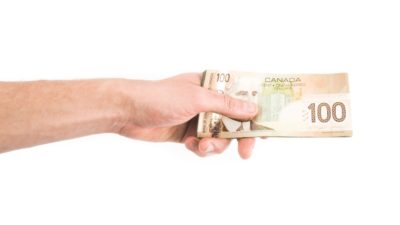The Canada Revenue Agency (CRA) is extending the Canada Emergency Response Benefit (CERB) by an additional two months. That’s great news for out-of-work Canadians who are struggling to find work and get back on their feet. But it’s a surprising move — one that could lead to problems down the road for many Canadians.
Here’s why:
People may not be setting enough of the CERB payments aside for taxes
The CERB is a taxable benefit. That means it’s income that you’ll potentially have to pay taxes on when you go to do your taxes in 2021. It’s hard enough doing taxes at the end of the year after you know how much you’ve made for the year, let alone trying to estimate your tax liability ahead of time.
And that’s what Canadians would have to do in order to accurately determine how much in taxes they’ll have to pay on the CERB.
But between calculating tax credits and determining whether you may go back to work later this year, you’re likely better off just taking your best guess. If you can at least get your tax bracket right, then you’ll know roughly what percentage take off your CERB payments. Either way, it’s guaranteed to cause a headache for many Canadians when it’s tax time.
For CERB recipients who aren’t eligible, they’ll be digging themselves into an even bigger hole
More than 190,000 Canadians have already paid back CERB payments to the CRA. But that doesn’t factor in the recipients who may not know they’re ineligible. Including the extended CERB period, recipients could potentially receive $12,000 from CERB.
People who spend that entire amount and aren’t eligible for it will be in for a nasty surprise when the CRA comes calling.
Don’t forget the impact this will have on everyone else
The more the government dishes out in CERB payments, the more debt the country will get itself into. And you know who will be footing the bill for these CERB payments in a few years — the taxpayer.
Whether it’s new taxes, increases to income tax, GST, or an increase in price for every government service, you can be sure that taxpayers will be paying a lot more to the government once the economy recovers from COVID-19.
Even if you aren’t paying back CERB or won’t have to pay taxes on it next year, that doesn’t mean you won’t be paying the government for the CERB in other ways.
Save your money and put it in a TFSA today
There’s one safe place you can put your money into and not worry about taxes — a Tax-Free Savings Account (TFSA).
One stock you may want to put there is the Bank of Montreal (TSX:BMO)(NYSE:BMO). Currently, investors can secure a dividend yield of more than 5% when buying shares of BMO. That’s a great payout that inside of a TFSA is not taxable. And, in addition, investors will also benefit from the bank stock’s rising value over the years.
Bank stocks have been hit hard by COVID-19 and they’re relatively cheap compared to where they were prior to March and when the World Health Organization officially labelled COVID-19 a pandemic.
There’s lots of good value there for investors today. Whether it’s BMO or another bank stock, they can be great options to put your money into today and help grow your portfolio.
Bank stocks like BMO will only rise in value over the long term, as will their dividend payments.








